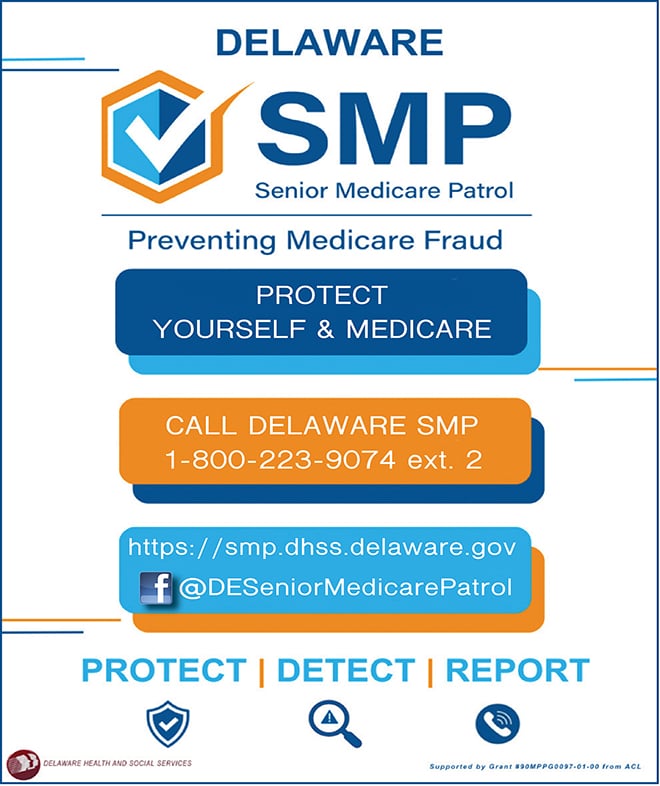The Silent Thief: Medicare Fraud
 By Lena Thayer
By Lena Thayer
It seems that with every interaction we have; there is an opportunity for a “bad actor” to take our personal information and exploit it. While we watched technology evolve and integrate into our daily lives, our personal data has become an important commodity; one that we need to safeguard. This is especially true with our private health information. Medicare beneficiaries have been falling victim to errors, abuse, and fraud to the tune of (est.) $60 Billion annually throughout the U.S. The Senior Medicare Patrol is committed to empowering and assisting Medicare beneficiaries, their families and caregivers know how they can protect themselves, detect potential issues and report when they find a problem. In this article we will discuss the top ways to protect your personal health information from exploitation.
Protect
When it comes to preventing Medicare fraud, you are the first line of defense. Best practice is to never share your information with anyone who is not your doctor or health care provider. Many people receive unsolicited calls, emails, texts and sometimes even in person visits with a promise of free or heavily reduced medical equipment, genetic testing, treatments and much more.These solicitors are highly adept at using compelling stories to earn your trust, leveraging their experience to take advantage of you. By hanging up the phone, refusing to give out your Medicare number and ensuring you only receive treatment or supplies from your health care provider, you are taking an active stance to protect yourself.
Detect
Just as it is important to safeguard your personal data, it is also important to review your medical statements for accuracy. Anytime you receive your Medicare Summary Notice (MSN) or Explanation of Benefits (EOB), you should review them carefully to ensure every service that it says was provided is what you were seen for. Let’s face it, people make mistakes and sometimes a simple coding error can cause you big problems with healthcare cost.
Checking your statements and working with your healthcare provider to update your records accurately keeps you and your future benefits safe. Additionally, a common form of Medicare abuse is called upcoding. Upcoding is when healthcare providers charge Medicare for a service for more time than what was treated; like charging for three hours of occupational therapy instead of two. Or they may charge for a higher paying related service; like stating the treatment was for COPD instead of the common flu.
By keeping track of all your medical appointments, prescriptions, and comparing them to your MSN or EOB you are staying vigilant in protecting your benefits.
The Delaware Senior Medicare Patrol has a My Healthcare Tracker that can help by giving you a consolidated easy booklet to track all your medical appointments and details. If you would like a My Healthcare Tracker, you can reach out to have one sent to you.
Report
If you believe that your Medicare number has been compromised, it’s important to act as soon as possible. The longer the bad records remain, the higher the chance of the issue never being rectified. In the case of seeing what you believe to be an error on your MSN or EOB you should contact the healthcare provider first, asking them to explain and correct the records. If your provider will not make the change or cannot explain the charge to your satisfaction, you can get help.
Ultimately, each of us serves as our strongest defense against Medicare fraud. By remaining vigilant in safeguarding our personal information and thoroughly reviewing our medical statements, we guarantee the accuracy of our records and safeguard our financial and medical benefits.
A Call To Action
The Delaware Senior Medicare Patrol is dedicated to empowering the community via outreach and education. We do this by having a presence at events throughout the Delaware community and giving presentations to community groups throughout the state. Our program is largely able to perform their work through the help of volunteers like you. Our volunteers work directly with the public to Protect, Detect and Report suspected Medicare errors, abuse, and fraud. If you are interested in joining our fight, please contact us today at 302-255-9774.
302-255-9774
Follow on facebook @DESeniorMedicarePatrol
and instagram @deldhss


